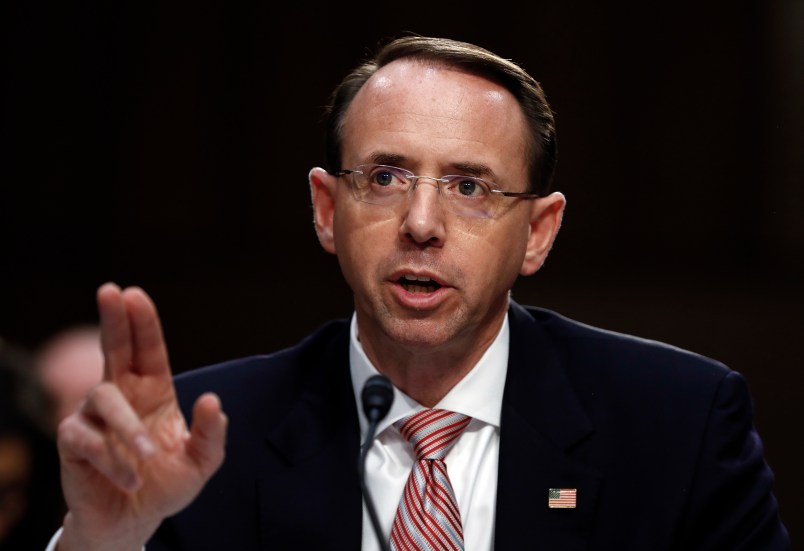Wading into the debate over the effect of Russian meddling on the 2016 election, on Thursday Deputy Attorney General Rosenstein played down the impact of Russian-backed ads posted on various online platforms.
“American citizens are pretty savvy, and they decide who to vote for,” he said in a podcast interview on the Target USA network. “I don’t think they’d be influenced by ads posted by foreign governments.”
No assessment of Russian interference in the election has attempted to measure whether or not that interference was effective, but all of them concurred that it happened. The extent of the Russia-backed ads, intended to sow division during the election, on major platforms like Facebook and Twitter has only become publicly known in recent weeks.
Rosenstein, in his role as acting attorney general for the Russia investigation, appointed Robert Mueller as special counsel and is overseeing Mueller’s probe. Attorney General Jeff Sessions had previously recused himself from matters relating to Russian interference.
Rosenstein hedged in his remarks, referring to Russian election tampering as “alleged” and in the hypothetical in the podcast interview published Thursday. Despite affirmative public assessments of Russian meddling by the intelligence community as far back as October, Rosenstein’s strongest assessment was that “if we have foreign countries that are seeking interference in our elections, I think we need to take appropriate action in response.”
Rosenstein referred the matter to the intelligence agencies when asked what kinds of consequences the Department of Justice could mete out to the Russian government for meddling in the 2016 election.
“Combating cyber-threats is a role the Justice Department has something to do with,” the DOJ’s second-in-command admitted, “but the primary responsibility for dealing with those threats falls on the intelligence community.”
Target USA’s network, PodcastOne, distributed Rosenstein’s full quote playing down Russian attempted election tampering.
“I think, what you need to recognize is that there have been a number of public reports about alleged Russian activities related to the election, including a report of the intelligence community, and what you’ve asked about public information, you have in an unclassified version of a report that reflects the assessments of our intelligence community. There have also been public reports, recently, about allegations of Russian advertisements, for example, that were posted on various networks. And so, there are a lot of public sources of information out there, and I think what people need to keep in mind is that there’s a distinction between people trying to sway American elections, and succeeding in swaying American elections. I think one of our responsibilities is to make sure that people understand, you know, what the risks are, but also that they make their own determinations. You know, American citizens are pretty savvy, and they decide who to vote for. I don’t think they’d be influenced by ads posted by foreign governments. I think people are more thoughtful about that in the way that they make their decisions. But nonetheless, you know, if we have foreign countries that are seeking interference in our elections, I think we need to take appropriate action in response.”
On a separate topic, Rosenstein was more certain about his views on the role whistleblowers: Setting aside legal considerations, “any responsible person” has “a moral obligation not to disclose things if it’s going to cause harm,” he said.
People who distribute information to the press, Rosenstein asserted, do not count as whistleblowers. “There are accepted ways in which you can raise concerns if you work for the government and you have access to information that you believe represents a violation of law or policy,” he told Green. “There are lawful ways for you to raise those issues. But leaking it publicly in a way that’s going to harm national security is not one of those authorized ways.”









